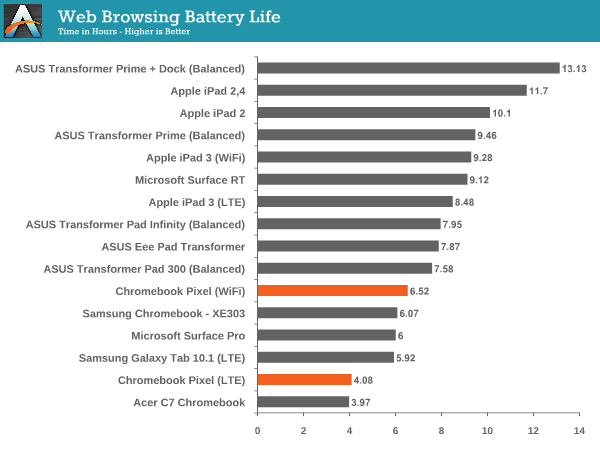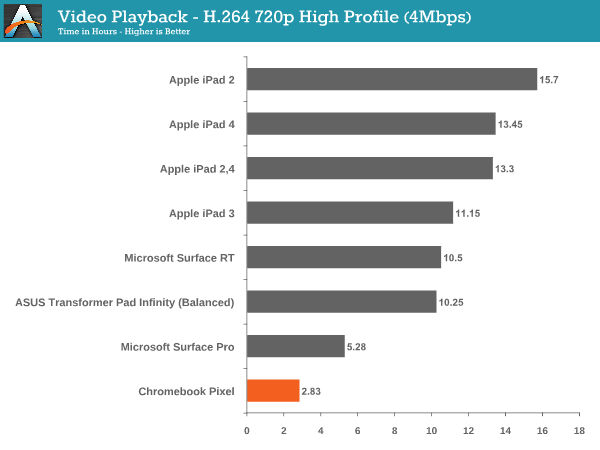The Chromebook Pixel Review
by Jason Inofuentes on May 31, 2013 8:00 AM ESTBattery Life
Like our performance tests, our battery test borrows more from our tablet reviews than it does our notebook reviews. The inability to run any native software here limits us to... well, to the browser. So, we start with our web browsing test. The idea is straightforward, we’re cycling through four websites, disabling any background services that might interrupt the process and setting the display to our customary 200 nits. This test is designed to challenge ARM cores, giving them just enough time to render a page and go back to sleep before asking for the next page. This isn’t as challenging for Ivy Bridge silicon, which is able to complete the render and rush to sleep much faster, which we know can yield better average power consumption and better battery life. The other factor that affects battery life in this scenario is that display. With over 4 million pixels to light up, the panel is going to chew through power a lot faster than something less dense. Only one way to found out how it goes, though.

The Pixel ends up eking out 6.5 hours on WiFi, besting the Surface Pro by a bit, but it’s much more a wash, the larger battery’s added capacity is exhausted by the more power hungry screen. On LTE the Pixel puts up 4.08 hours of stamina; enough for a few hours at a cafe, but not an all day untethered session.
Our video test loops a 720p video encoded with H.264 with an average bit rate of 4 Mbps with the screen once again set at our traditional 200 nits. Running this test on a Chromebook is a little different than any other platform. The video player does exist somewhat outside the browser, but the software is written in HTML5. Hardware accelerated decode of H.264 content is a staple of Chrome and HTML5, though. Right?

This is really awful, and surprising performance. The best explanation we can muster is that an issue in the video player is preventing this file from utilizing hardware decode resources. In that case, decoding and then scaling the video to match the display might tax the system enough to cause this sort of poor performance. If that's the case then an update could drastically impove this score; until then, though, the Pixel does not make for a good media companion on the road.
Ultimately, what we’re really seeing in these charts, is that the rush to sleep advantage Ivy Bridge has over ARM is not enough to overcome ARM’s power envelope. The Pixel’s silicon is a 17W part. Even the most power hungry ARM SoCs in this table clock in below 5W. That’s a deficit that’s going to be hard to overcome... for now. There’s a very real reason to suggest caution in buying anything with Ivy Bridge right now, Anand made the same case in his Surface Pro review. A Haswell alternative in the future should exhibit better battery life, with equivalent performance. There’s also the Atom refresh (Silvermont) to consider; a quad-core Baytrail part could provide plenty of performance while drawing a lot less power than the Ivy Bridge part we’re using today.
Is the Pixel going to let you sit in the park all day, working on the great American novel? No, it won’t. Heck, it might not get you through a longish movie during a flight. If untethered stamina is a prime concern, look elsewhere than really any of the Chromebooks. If you’re near an outlet most of the time, this performance just isn’t great. When you design a thin, modern notebook, you have to make compromises, and in this case, battery life was one of them.










74 Comments
View All Comments
augustofretes - Saturday, June 1, 2013 - link
Wow, people can get deeply unrealistic. Please, could you show me a comparable machine (build quality, screen resolution, touchscreen) that costs $1,000? Oh? You can't? That's because that machine doesn't exist.My only problem is Google's insistence on shipping devices with less drive space than they need, the 32GB Pixel shouldn't exist, just like the 8GB Nexus 4 shouldn't. If the 1,300 USD Pixel had 64GB of storage it would be no brainer (I can install Linux on it, which I already use as my main OS).
jeffkro - Monday, June 3, 2013 - link
I only have a 64GB hard drive on my windows laptop, its good enough for me. I basically use my windows laptop the same way you use a chrome book. I browse the internet with chrome browser, email with gmail, use google docs, and use google drive as a replacement for window's my documents folder.ExarKun333 - Friday, May 31, 2013 - link
This thing is horrible. You would be better-off getting a Chrome book AND an Ultrabook and just use one or the other when appropriate. Junk...Dentons - Friday, May 31, 2013 - link
A product isn't applicable to your needs, so it's horrible for everyone?We can only be glad you're not a review writer.
bleh0 - Friday, May 31, 2013 - link
What I get from this is:"It is pretty, really pretty"
"The screen is nice but not perfect"
"The OS is limited and performance isn't that good"
"Battery life is below average to say the least"
The next generation of laptop/tablet/hybrids are going to be high resolution and pack Hasewell there is no reason to get this.
hughlle - Friday, May 31, 2013 - link
I can't really for a second see why I would buy this over the mac, even being an apple hater, let alone just buying a good quality ultra book. Chrome os does nothing for me at this price bracket. To me chrome os belongs in the net book market, not the, in my view, higher end price bracket.I'll stick to looking at the Samsung 5 series ultra books I think. Other than the screen, which for the size is tbh, fine for me given its for web and typing, the Samsung seems the much better deal.
inighthawki - Friday, May 31, 2013 - link
Now if only it had a 256GB SSD and Windows on it...hughlle - Friday, May 31, 2013 - link
Indeed.Although I have to say, as a user with up to 6tb of storage per computer, for an ultra book form factor computer, a 128gb ssd is more than sufficient for my needs.
Crono - Friday, May 31, 2013 - link
No offense to the writer, but is there really a page titled "Status" in an AnandTech article?I was hoping that would be the name of a feature, but unfortunately I was wrong. When did we sink to the level of talking about computers as status symbols on one of the leading enthusiast computer hardware sites? I mean I expect the discussion in forums, but it's not something that deserves an entire page in a review.
lmcd - Friday, May 31, 2013 - link
I don't know, it's a big factor in sales. And volume is supposedly an issue with this product, so I think it's relevant.